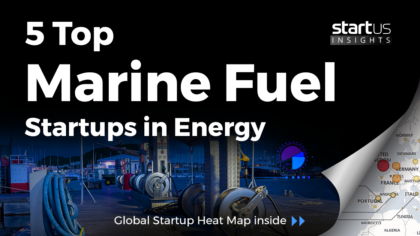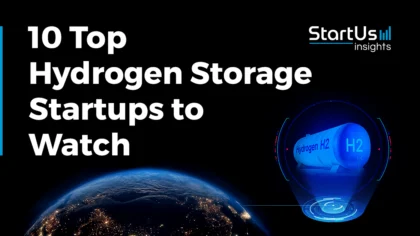Our Innovation Analysts recently looked into emerging technologies and up-and-coming startups working on solutions for the energy sector. As there is a large number of startups working on a wide variety of solutions, we want to share our insights with you. This time, we are taking a look at 5 promising marine fuel startups.
Heat Map: 5 Top Marine Fuel Startups
Using our StartUs Insights Platform, covering 1.116.000+ startups & emerging companies, we looked at innovation in the field of energy. For this research, we identified 121 relevant solutions and picked 5 to showcase below. These companies were chosen based on a data-driven startup scouting approach, taking into account factors such as location, founding year, and technology among others. Depending on your specific criteria, the top picks might look entirely different.
The Global Startup Heat Map below highlights 5 startups & emerging companies developing innovative marine fuel solutions. Moreover, the Heat Map reveals regions that observe a high startup activity and illustrates the geographic distribution of all 121 companies we analyzed for this specific topic.
Paterson Energy – Thermo Chemical Depolymerization
The generation and accumulation of plastics cause significant environmental pollution. Several technologies look to address the challenge of reducing or recycling plastic waste. One example is thermal depolymerization, which mimics the natural processes that allow for the formation of fossil fuels. Usually, companies produce light crude oil by treating biomass and plastics this way. This crude oil is later converted into useful products for industrial use, such as marine fuels, and other waste to energy products.
Indian startup Paterson Energy provides useful replacements for conventional fuels by converting sorted plastic waste to fuel oil and carbon black. They utilize a thermochemical depolymerization technology to produce an end product called Verte-X. This fuel presents similar calorific values as diesel and is suitable for marine or diesel generator engines. Also, Verte-X serves as an alternative fuel for industrial boilers and cement plants, among others.
GoodFuels – Bio-Fuel Oil
Biofuel is another sustainable replacement for fossil fuels. Governments and emerging companies alike are building sustainable supply chains to acquire and convert biomass into fuels. With the rising demand for transportation of goods, services, and people, biofuel provides a sustainable alternative to power trucks and shipping vessels. This industry segment accommodates companies that manufacture biomass pellets, convert biomass into fuel, and develop alternatives to replace fossil fuels.
Dutch startup GoodFuels produces second generation sustainable biofuels from certified feedstock that is either waste or residue. Their process removes the challenges associated with land-use and does not impede on food production or deforestation. Their MR1-100 bio-fuel oil is a suitable replacement for low-sulfur fuel oil or heavy fuel for vessels. It eliminates sulfur and significantly reduces carbon dioxide (CO2) emissions. Moreover, this bio-fuel oil is compatible with the current engine and tank infrastructure.
Optima Process Systems – Sustainable Fuel Upgrader
Heavy oil contains some of the longest chains of hydrocarbons and has high viscosity. This opens opportunities for breaking it down into lighter crude oil or other fuels. Altering the hydrocarbons by removing or adding hydrogen or carbon forms the basis of upgrading heavy oil. Startups and emerging companies work to develop upgrading technology to reduce the levels of emissions from marine transportation.
The US-based startup Optima Process Systems offers innovative low-cost solutions to reduce the environmental impact of transportation fuel. The startup engages with heavy fuel upgraders to provide clients with land-based and ship-based upgrading options. The startup also provides desulfurization solutions that produce low-sulfur fuel oil for ships. Optima achieves these results by collaborating with oil traders and technology providers to improve processes, both at refineries and at upgrading facilities.
Arq – Microfine Hydrocarbon Coal Conversion
Despite oil extraction and fracking, more than a quarter of global energy still depends on coal. Burning coal, apart from emitting harmful gases, also produces various waste products. Coal mining currently involves intensive land use, often leaving swathes of land unusable due to coal refuse. Emerging energy technology companies look to develop sustainable solutions to tackle coal and coal waste management by converting it to alternative fuels.
British startup Arq develops a patented process that separates pure hydrocarbons from mineral matter, transforming coal and coal waste into Arq Fuel, a micro-fine powder suitable for blending into oil products. Arq’s technology first reduces coal particle size and then separates hydrocarbons from impurities. Later, the hydrocarbons are dried using a mechanical press to create a wet cake, suitable for shipping to an oil terminal. Finally, Arq Fuel is blended with crude oil and other fuels.
CIRCON Environmental – Advanced Petrochemical Distillation
Off-spec or special-spec products are usually produced by manufacturers as by-products during the production of various chemicals and oils. Products that fail to meet certain quality specifications but have other uses, such as for burning or as a solvent, have many buyers in the market. Further, emerging technology solutions look to distill, refine, and convert contaminated products, used oil, and distilled products into suitable alternative fuels for marine transportation.
The US-based startup CIRCON Environmental creates solutions to combat the business challenges involving waste and off-spec petrochemical products. Petroleum, petrochemical off-spec products, and transmix are treated and repurposed, maintaining the material’s value rather than designating it as waste. Their distillation process is capable of handling up to 1000 barrels of feedstock per day. By employing techniques to quickly separate valuable components, the distilled products form an integral part of CIRCON’s fuel blend or gasoline. Their facility at Hwy 225 utilizes a unique electric heater that allows for a faster start time and a wider range of distillation curves and products.
What About The Other 116 Solutions?
While we believe data is key to creating insights it can be easy to be overwhelmed by it. Our ambition is to create a comprehensive overview and provide actionable innovation intelligence so you can achieve your goals faster. The 5 marine fuel startups showcased above are promising examples out of 121 we analyzed for this article. To identify the most relevant solutions based on your specific criteria, get in touch.









